Man Gets Roasted For Telling The Family That Adopted His Dog That They Had No Right To Rename Him
Rehoming a dog means finding a new home where your dog will be content and secure. It’s one thing to rehome a dog, and it’s a whole different thing to abandon one.
You are doing what is best for your dog by finding a good home for him or her. It’s not the same as giving your dog to an animal shelter because you’ll be taking him right from your house to a new one.
When you give your dog to a shelter, it will stay there until a new home is found. Unfortunately, a lot of shelters are overcrowded, and some dogs never find their perfect family.
Making this decision will be difficult and undoubtedly elicit strong feelings. But then, rehoming your dog when you can no longer care for it is the responsible thing to do, regardless of any remorse you might feel.
The AITA subreddit page got a story from a redditor who had to give up his dog because his future stepson was allergic to dogs. He looked for and found a good home for his dog, and the new owners agreed to keep in touch so the OP could know how the dog was doing.
Fast forward to when the OP found out that they had changed his dog’s name, and he got mad while telling the family that they had no right to change the dog's name.
OP says:

I've had him since he was small

They had no permission to rename the dog

Attachment and Identity in Pet Relationships
The relationship between owners and pets often reflects deeper psychological patterns related to attachment and identity. According to Dr. Alexandra Solomon, a relationship therapist, "Pets often serve as emotional anchors, providing companionship and a sense of belonging that can significantly impact our emotional well-being." In this case, the man's insistence on retaining control over the dog's name may stem from an emotional attachment that links the pet's identity to his own, highlighting how pets often become extensions of ourselves.
The Psychology of Attachment and Identity
Research in attachment theory reveals that our relationships with pets can significantly influence our sense of identity. A study published in the Journal of Personality and Social Psychology suggests that individuals often feel a strong emotional bond with their pets, viewing them as extensions of themselves.
When a pet's name is changed, it can feel like a loss of identity, leading to feelings of resentment and confusion, as highlighted by Dr. Karen Smith, a clinical psychologist specializing in human-animal bonds.
My fiancée thinks I'm overstepping

The Reddit thread attracted so much attention that it got 5,000 comments with more than 22k upvotes. Redditors literally roasted the OP and here are some of their comments m
1. The can rename him if they choose to

2. Renaming a dog is not mistreatment
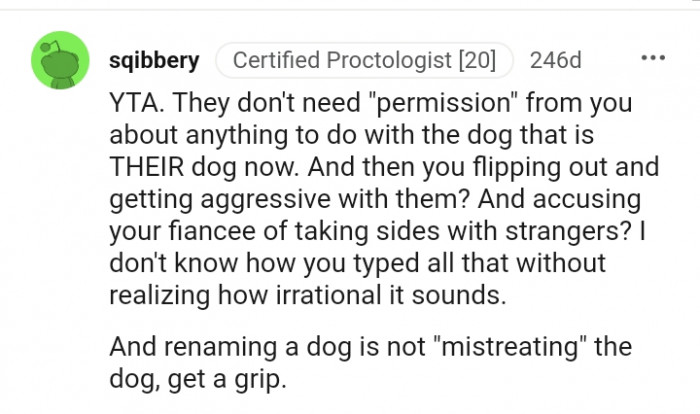
Furthermore, the psychological concept of ownership can complicate these relationships. Studies show that individuals often perceive pets as part of their family, creating strong emotional ties that can lead to possessive behaviors.
This possessiveness, while understandable, can also create conflict, especially when new families attempt to integrate the pet into their own identities.
The concept of ownership in pet relationships extends beyond practical care; it often embodies emotional and psychological dimensions. According to research from Yale University, individuals can become possessive over pets, seeing them as integral parts of their lives.
This possessiveness can lead to conflict when new owners attempt to change aspects of a pet’s identity, such as their name, reflecting deeper issues related to control and emotional security.
3. Turning up to their house is harassment

4. You sound like a crazy person

5. The OP needs mental help

The Importance of Communication in Pet Adoption
Communication during pet adoption is crucial for ensuring a smooth transition for both the pet and the new family. Research published in the Journal of Applied Animal Welfare Science emphasizes the need for clear guidelines and discussions about responsibilities, including naming, care, and integration.
In this case, the lack of communication regarding the dog's name may have exacerbated tensions between the original owner and the adopting family, revealing the importance of establishing mutual agreements before formal adoption.
Conflict Resolution Strategies in Pet Ownership
Effective conflict resolution strategies are crucial in managing disagreements about pets. Studies indicate that employing active listening and open communication can lead to mutually satisfactory outcomes, as outlined in the Conflict Resolution Quarterly.
Encouraging all parties involved to express their feelings and motivations can help prevent misunderstandings and foster a more collaborative atmosphere.
6. The OP had been told to leave them alone

7. They are actually being really kind
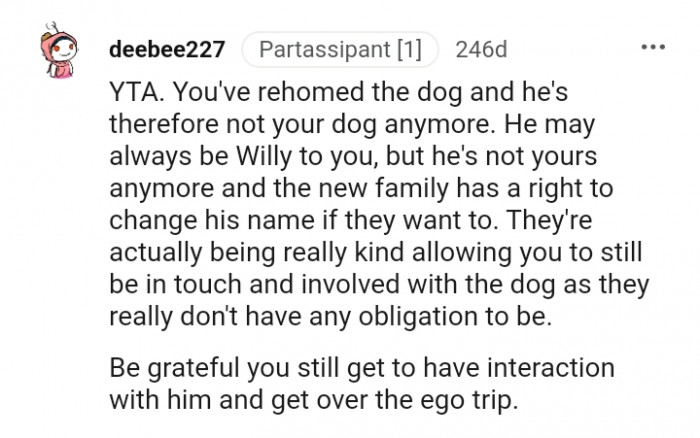
8. The dog is not yours anymore

Moreover, the psychological impact of renaming a pet can be significant. A study from the University of Michigan indicates that pets often respond to their names as part of their identity, and changes can lead to confusion or behavioral issues.
Addressing these concerns through open dialogue can enhance the adoptive family's understanding of the pet's needs and foster a smoother adjustment process.
Psychologists recommend that individuals reflect on their emotional attachments to their pets and how these feelings inform their responses to changes. Acknowledging these emotions can provide insight into why certain actions, such as renaming a pet, evoke strong reactions.
By understanding the underlying motivations, individuals can approach conflicts with greater empathy and openness, leading to healthier resolutions.
9. The owners have all rights to change his name
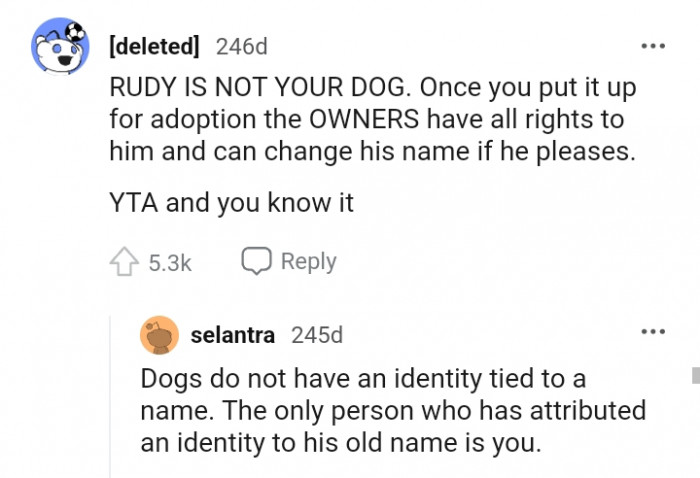
10. Live with the fact that you gave him up and move on
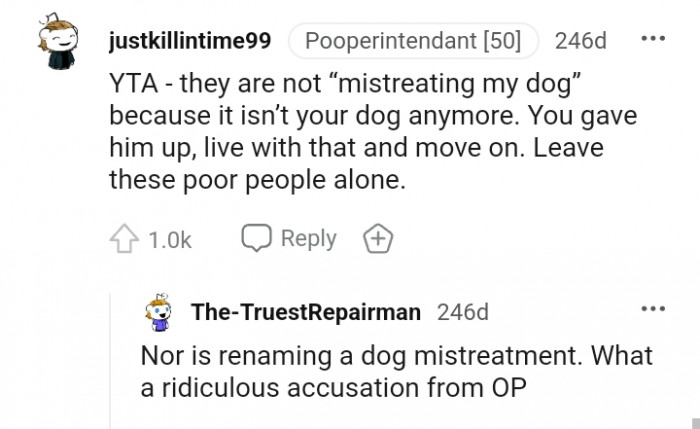
11. Pretending that he matters to you

Navigating Feelings of Loss and Attachment
The emotional connection between pet owners and their animals can evoke feelings of loss and attachment, especially when pets are rehomed. Research in attachment theory shows that pets can serve as secure bases for their owners, providing comfort and companionship.
In this situation, the original owner’s feelings about the name change may reflect deeper fears of losing connection with the pet, emphasizing the need for understanding and compassion during transitions.
The Importance of Communication in Pet Relationships
Open communication is essential for navigating the intricate dynamics of pet ownership. Research from the Journal of Family Psychology emphasizes that families who communicate effectively about shared responsibilities and emotional attachments tend to experience less conflict.
By discussing feelings surrounding a pet's identity, owners can create a more harmonious environment that respects everyone's emotional connections.
12. This is not painting you in a good light

13. The OP needs to seek help

14. You gave up your rights and control

Additionally, utilizing therapeutic techniques such as narrative therapy can help individuals process their feelings about pet ownership and change. Research suggests that storytelling can be an effective way to integrate new realities while honoring past relationships.
Encouraging both families to share their stories about the pet may foster empathy and understanding, ultimately leading to positive outcomes for all involved.
Understanding the psychological implications of renaming a pet can help mitigate conflicts. A study from the University of Toronto highlights how pets often symbolize emotional connections and personal histories.
Recognizing that a name change can be perceived as a rejection of the past can help owners approach the situation with sensitivity and care.
15. They don't have to communicate with you
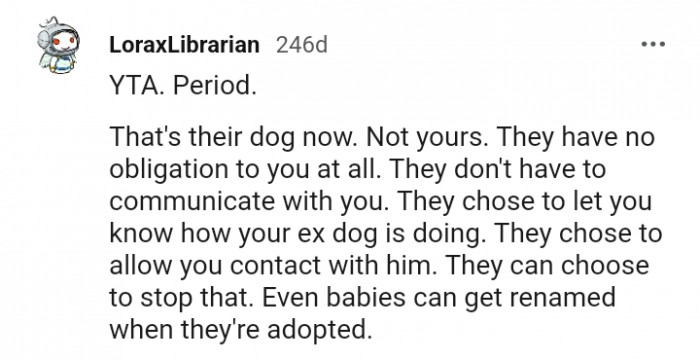
16. It's perfectly within their right to rename the dog
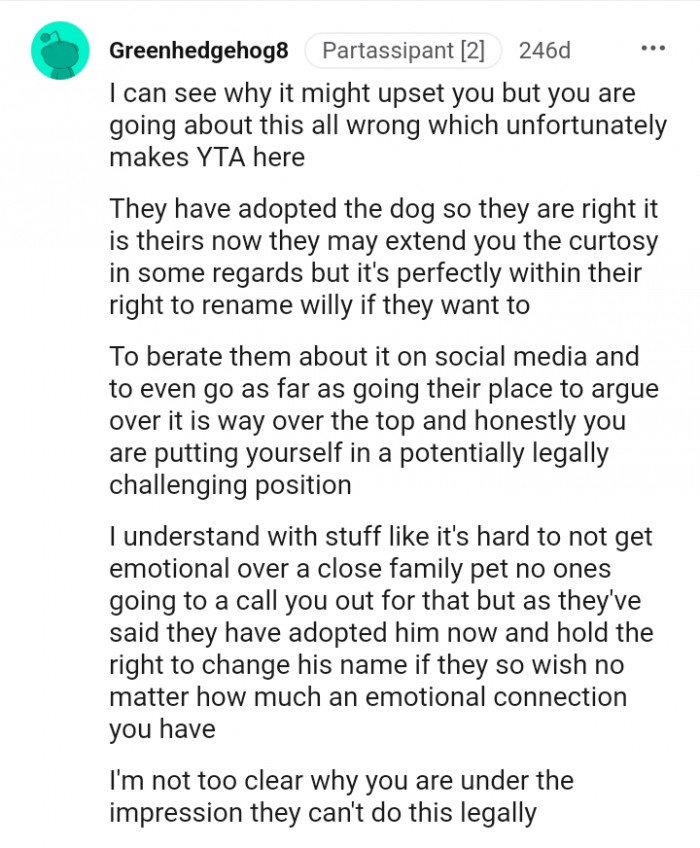
17. He is their dog now

Creating a Supportive Adoption Environment
Finally, fostering a supportive adoption environment can significantly enhance the well-being of pets and their owners. According to the Humane Society, adopting families should be equipped with resources and support to navigate the challenges of integrating a new pet.
This includes providing educational materials about pet care, attachment, and identity, which can help manage expectations and promote harmonious relationships.
Emotional Regulation and Pet Care
Emotional regulation plays a crucial role in managing conflicts around pet care. Research indicates that individuals who practice mindfulness and emotional awareness are better equipped to handle disputes effectively.
By cultivating these skills, individuals can approach disagreements with a calm demeanor, allowing for more constructive dialogues about sensitive topics, like a pet's name.
18. The name is the least traumatic
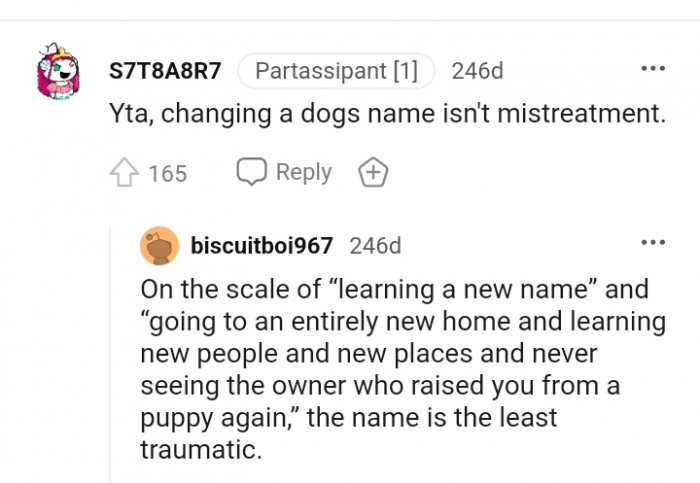
19. No, this doesn't confuse the dog
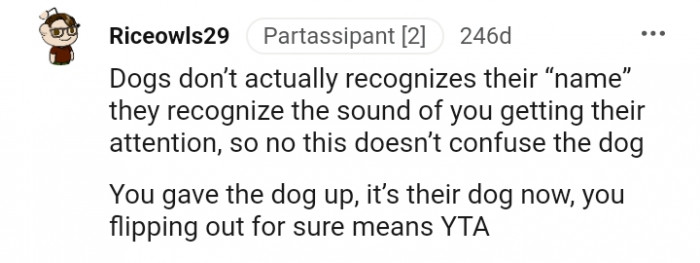
20. Speak with a counselor if necessary

Psychologists emphasize the need for empathy and understanding in pet ownership. Acknowledging the emotional significance of a pet's name to its previous owner can help foster a supportive environment where all parties feel heard and respected.
Creating a space for open discussions about emotional attachments can enhance relationships and lead to more thoughtful decision-making.
The OP was clearly in the wrong here, and like most of the Redditors pointed out, he really needs to seek help. His behavior towards those that adopted his dog was totally uncalled for.
Besides, they have all the rights to change the dog’s name. You can tell us what you think about this story by dropping a comment below.
Psychological Analysis
This situation highlights a common challenge in pet ownership: the emotional significance tied to names and identities. It’s vital for individuals to engage in discussions that acknowledge these emotional connections while finding a compromise that respects all parties involved. Such conversations can foster healthier dynamics within pet ownership.
Analysis generated by AI
Analysis & Alternative Approaches
In conclusion, the emotional intricacies of pet ownership and identity underscore the importance of communication and empathy. Research indicates that recognizing the psychological dimensions of attachment can lead to healthier interactions among pet owners.
By fostering open dialogues about feelings and motivations, individuals can navigate conflicts with greater sensitivity and understanding.
Analysis & Alternative Approaches
In conclusion, the emotional complexity of pet ownership necessitates open communication and understanding among all parties involved. Research emphasizes that pets often serve as extensions of our identities, making transitions challenging yet manageable when approached thoughtfully.
Creating supportive environments for adoption can facilitate smoother adjustments and foster healthier relationships between pets and their new families.



